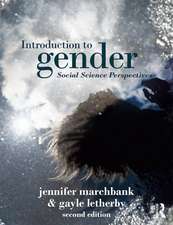Gender, Culture, and Physicality
Autor Helen Sterk, Annelies Knoppersen Limba Engleză Hardback – 29 dec 2009
Preț: 686.68 lei
Preț vechi: 891.80 lei
-23% Nou
Puncte Express: 1030
Preț estimativ în valută:
131.46€ • 136.64$ • 108.99£
131.46€ • 136.64$ • 108.99£
Carte tipărită la comandă
Livrare economică 07-21 februarie 25
Preluare comenzi: 021 569.72.76
Specificații
ISBN-13: 9780739134061
ISBN-10: 073913406X
Pagini: 144
Dimensiuni: 155 x 229 x 15 mm
Greutate: 0.39 kg
Editura: Rowman & Littlefield
ISBN-10: 073913406X
Pagini: 144
Dimensiuni: 155 x 229 x 15 mm
Greutate: 0.39 kg
Editura: Rowman & Littlefield
Notă biografică
Descriere
Gender, Culture and Physicality explores and challenges cultural obstacles associated with gendered meanings given to physicality, or bodies in action. The authors argue that these meanings reflect cultural attitudes toward women and men and shape people's choices, but can be changed through conscious "degendering."












